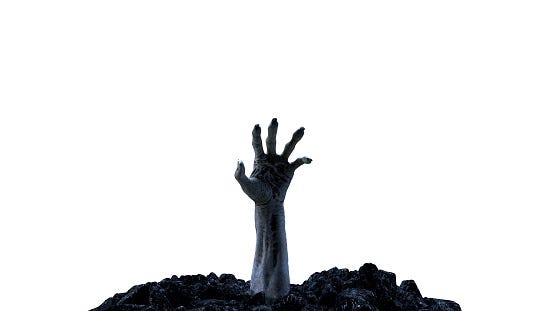When cheap borrowing is prevalent, unicorns, leprechauns, and coincidentally zombies start arising, just in time for it all to crash and burn!
WELCOME TO THE CLASSIC FAIRYTALE.
Spoiler alert, they never exist!
That’s actually good news since it means bad times never last forever either!
As a reference, bear markets on average last a year.
Who knows, we may be in a current recession now and not even know it.
In sum, planning for the worst, hoping for the best is your best tool!
The true test of time is to witness how strong a company is when soaring 40-yr-high inflation, a strong dollar, and rate hikes are sweeping the economy and markets that can shake, plummet, and deter a weak business plan within days or baby unicorn startup within an instant.
Since rates have been at historic rock-bottom levels for a decade or so, this is causing for more concern to arise among the variety of companies, or so-called, zombies that have simply survived and stayed intact, think WeWork, Rivian or Lucid’s sky-high obscene valuations compared to traditional established automotive giants, all due to cheap, abused, and arguably, not real capital flowing everywhere to everyone for so long.
There is a fine line every business must walk on to not cause instability and cracks to the bottom-line.
When it comes to capital and the delicate use of money (capital), once it’s overused or worse, abused, it can easily blindside a company and become a lethal weapon when misused. As they say, mo money, mo problems.
In the case of the thousands of SPACs and IPOs that were executed during the hottest days of the pandemic when stimulus from a fiscal and monetary side was rampant, anyone, anything with simply a business idea or somewhat formulated plan as Adam Neumann probably did best with, could convince any VC or billionaire investor in town that they’ll be Uber-rich in no time, as long as they are fed funding for at least a few more years until they crossover the breakeven point.
Now, although most companies shouldn’t, nor aren’t profitable from the gecko, it’s pretty foolish to believe that during a speculative frothy market, good times will last forever.
With equities once trading at ~23x times their earnings in 2020–2021 and now at more reasonable levels investors can base reasonable assumptions and projections with at around ~16x earnings, delusion is never a good sign, and investors who got too carried away should already be of concern in a high interest rate environment. Whether capital is scarce or abundant and cheap, a model is a model. It should prove itself during any time, not only during euphoria episodes.
When looking out for ‘zombies’, a sentence I never expected to write, these companies’ stock prices have underperformed the general equity benchmarks such as the S&P 500 Index by at least 5% in each of the past two years and are more than ever easy to identify and target.

Zombie Apocalypse
Although there’s talk on the street these days of nuclear weapons all the while a disastrous war is still going on in Ukraine, Vietnam discussions, global equity markets are plummeting and Europe is bracing for an expensive winter on the energy side of things and dealing with a plunging pound, ironically, the best environment to catch true disastrous zombies in is right now when public equities are faltering and this volatility naturally weeds out non-fundamentally backed poor business models, also known as zombie companies not made for the tough road ahead.
When everyone and everything is delusional throwing money in the air like they just don’t care in 2021, only basing valuations off their future expected earnings, sooner or later, no one wins. Even Meta is down more than ~60%+ YTD with the S&P ~23%.
When it comes to zombie companies, those that were able to entice investors that they are more than just a copycat of all the hundreds of other social media apps that will swallow them once they become popularized, it’s a good sign to see that only 13% of so of companies based in the U.S., according to GS Research, are considered zombie companies.
The zombie meaning lies in how fast companies are able to produce enough profit to cover their debts, expenses, COGS, if they have any, and cross over the break-even point for over three straight consecutive years. Tough in lala VC land!
Although as patriotic U.S. investors we may have all sorts of biases, most notably home bias of only believing U.S. based companies are the most resilient, toughest, and coolest, this may serve us well here. Looking only at U.S. firms and startups that have gone through at least 3 series funding rounds and are on the verge of an IPO or in the hands of a private equity giant, they may be stronger than anywhere else in the world, especially if backed by legacy venture capitalist such as General Catalyst to name a few swanky Silicon Valley masterminds that choose companies that are beyond the fluff. Usually… Only time will tell right?

Eaten Alive
A high-growth enterprise such as technology companies have traditionally been seen as more attractive due to their appeal to turn a profit the fastest with an attractive low cost model.
Compared to capital-intensive industries such as real estate or industrials, the price to acquire a customer, building, or just keep a customer is much more expensive than with a SaaS company or product such as an application that grows more organically and costs little to nothing to acquire a customer due to network effects.
Paying attention to companies in the Big Tech space is a must to weed out any high-flying delusional zombies nowadays.
Fortunately or unfortunately, during a time when Big Tech is crumbling due to short cash supply and valuations through the roof based off of murky future expected earnings, rising rates, excess volatility, and our favorite, uncertainty naturally weed out zombies that cannot scale long-term. This is similar to the process of layoffs, weeding out under vs over performers such as at Meta’s where hiring has completely stagnated.
Here in the U.S., the markets have done a pretty good job naturally identifying which companies go-to-go (gtg — for the cool zombies) even though they may seem profitable in the future. The number of so-called zombies are currently less than 4% of U.S. companies and counting even as established FAAMGs and Fortune 500s are getting slaughtered by the increasing uncertainty and looming recessionary fears.
Although going public may not be in the pipeline today for your unicorn turned zombie, ‘no’ doesn’t means ‘never’!
Especially as founder, you must have high hopes and focus on the horizon to get through the trecherous hike, sticky competition, and monopolies in the space.
Nothing worthwhile happens overnight, let alone a massive blowout sold-out sale. Predict and reach for consistent growing sales overtime, not short-term bursts for more predictable reliable growth and metrics.
With anything meaningful, even if it’s impossible at times, stick to it for the long term.
That’s what investors are for — to capitalize on the mission in the future.

